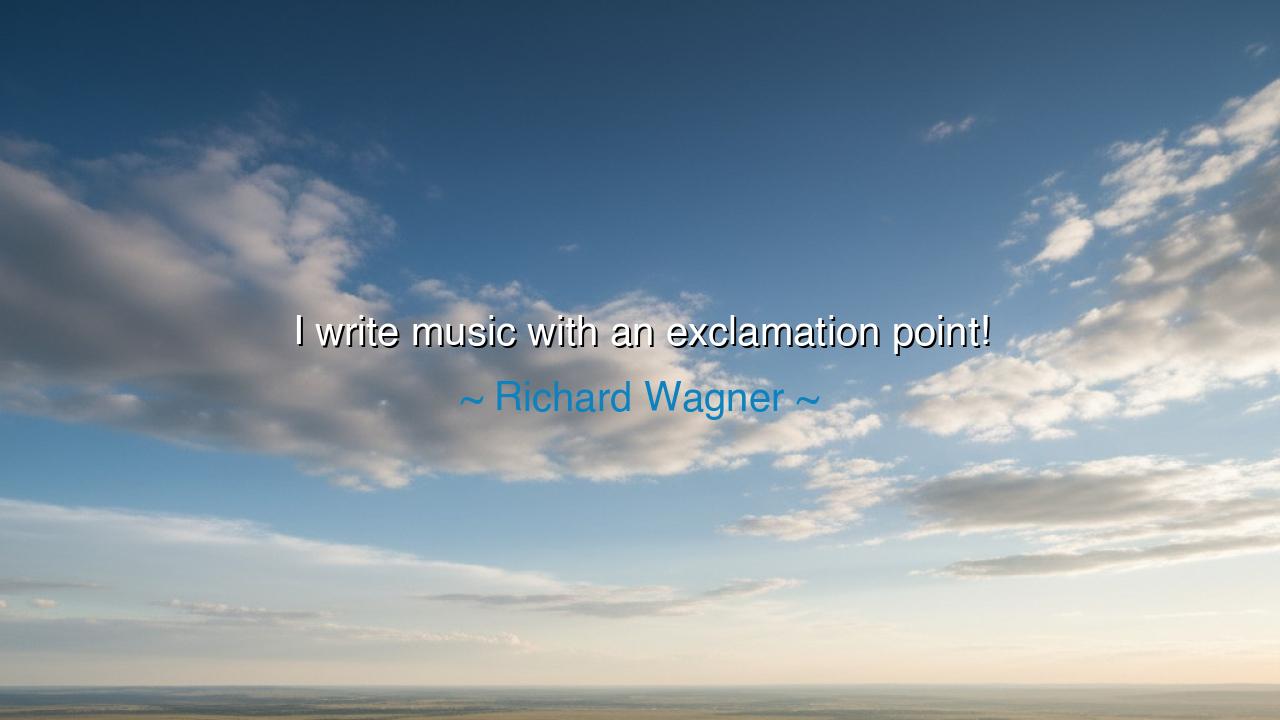
I write music with an exclamation point!






Hear these words of fire, spoken by the titan of sound, Richard Wagner: “I write music with an exclamation point!” This cry is not the boast of a man content with mediocrity, but the thunderous declaration of one who believed that art must never whisper when it can roar, must never falter when it can command. The exclamation point is not mere punctuation—it is the mark of urgency, of passion, of a spirit unwilling to be silent. In these words, Wagner teaches us that music, and indeed all creation, must be charged with force, purpose, and the burning heat of the soul.
Consider what it means to write with an exclamation point. It is to pour one’s spirit into the work, to refuse the timid note, the lifeless phrase, the hesitant stroke. To write with an exclamation is to strike as the hammer strikes the anvil, ringing with fire and clarity. It is to believe that each sound, each word, each action must carry weight, that it must awaken the sleeping heart and stir the weary soul. Wagner’s own operas, vast and towering as mountains, did not tiptoe into the world—they crashed upon it like waves, demanding to be heard, impossible to ignore.
This teaching finds its echo in history’s great acts of courage. Recall Martin Luther, who nailed his theses upon the door of Wittenberg. He did not write with a question mark, timid and uncertain; he wrote with an exclamation point, bold and unyielding, knowing his words would shake empires and summon storms. So too did Wagner believe that music should not merely entertain but transform, should not merely charm the ear but seize the heart and compel it toward the sublime. Greatness, whether in faith, in art, or in life, is born when men and women dare to live and speak with the force of an exclamation.
To write with such fervor requires courage. The world often demands moderation, quietness, the safety of compromise. But the exclamation point is the mark of defiance, the refusal to bow to dullness or fear. Wagner was reviled as much as he was revered; yet it was his daring that carved his name into eternity. Likewise, those who act with boldness may draw scorn, but they also awaken generations. The timid song fades; the thunderous one endures.
But we must not mistake the exclamation for noise without meaning. An exclamation point without truth is but an empty shout. Wagner’s art was fierce not only because it was loud, but because it was rooted in vision—the desire to blend poetry, drama, and music into one all-encompassing work of art. The exclamation point, then, is not merely about volume or spectacle; it is about clarity, conviction, and the unrelenting force of vision carried to its fullest height.
What then shall we, the heirs of such a teaching, learn? It is this: do not live your life with ellipses, drifting into uncertainty; do not punctuate your existence with timid commas, forever pausing and hesitating. Live with an exclamation point! Whatever you build, whatever you speak, whatever you dare to dream—let it be filled with force, clarity, and conviction. Let your presence in this world be like a stone cast into still waters, creating ripples that endure beyond your sight.
Therefore, take action in your own life. If you labor, do not labor half-heartedly—work with vigor, as if each task were a chance to carve your name into stone. If you love, do not love timidly—love with the boldness that changes lives. If you speak, let your words ring true, clear, and powerful. For the world does not remember the faint murmur; it remembers the cry that shook the silence. Be as Wagner declared: write, live, and breathe with an exclamation point.






AAdministratorAdministrator
Welcome, honored guests. Please leave a comment, we will respond soon